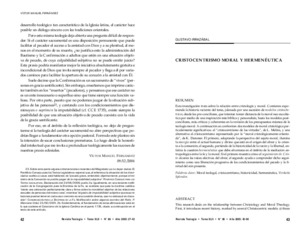Please use this identifier to cite or link to this item:
https://repositorio.uca.edu.ar/handle/123456789/18317| Título: | Cristocentrismo moral y hermenéutica | Autor: | Irrazábal, Gustavo Roque | Palabras clave: | CRISTOLOGIA; TEOLOGIA MORAL; VERITATIS SPLENDOR; HERMENEUTICA | Fecha de publicación: | 2005 | Editorial: | Pontificia Universidad Católica Argentina. Facultad de Teología | Cita: | Irrazábal, G. R. Cristocentrismo moral y hermenéutica [en línea]. Teología. 2005, 42 (86). Disponible en: https://repositorio.uca.edu.ar/handle/123456789/18317 | Resumen: | Resumen: Esta investigación trata sobre la relación entre cristología y moral. Comienza exponiendo
la historia reciente del tema, jalonada por una sucesión de modelos cristocéntricos,
desde los pre-conciliares, que intentan tomar distancia de la moral neo-escolástica
por medio de una inspiración más bíblica y personalista, hasta los modelos postconciliares,
más críticos y coherentes en la revisión de los presupuestos mismos de la
teología moral. A continuación se confrontan dos modelos de moral cristológica particularmente
significativos: el “cristocentrismo de las virtudes”, de L. Melina, y una
alternativa al cristocentrismo representado por la “moral cristológicamente orientada”,
de K. Demmer. El primero, adoptando la perspectiva del sujeto moral, ilumina
la sinergia entre el actuar humano y divino que está en el origen del obrar y lo orienta
a la comunión; el segundo, partiendo de la historicidad de la razón y la libertad, enfatiza
la cuestión hermenéutica que debe afrontarse en el ámbito de la mediación antropológica
entre la fe y la moral. Si el primero muestra cómo el seguimiento de Cristo
alcanza las raíces afectivas del obrar, el segundo ayuda a comprender dicho seguimiento
como una liberación progresiva de los condicionamientos del pecado y la finitud
del eón presente. Abstract: This research deals on the relationship between Christology and Moral Theology. First, it introduces recent history, marked by several Christocentric models: a) those from days before II Vatican Council, which attempted to draw a line far from neo scholastic moral theology, seeking for a more biblical and personalistic inspiration; b) post Vatican II models, critically coherent with the revision of the foundations of moral theology. Next, two peculiarly meaningful models of christologic moral theology are confronted: 1) “christocentrism of virtues”, of L. Melina, and 2) an alternative choice in front of christocentrism: K. Demmer’s “christologically oriented moral theology”. The former, from the standpoint of moral subject, draws light upon the synergy among human and divine action which lies in the origin of acting and points it towards communion; the latter, based on the historicity of reason and freedom, stresses the hermeneutical question which must be faced in the realm of anthropological mediation among faith and moral. If the former shows how to follow Christ reaches the affective roots of action, the latter helps to understand such following as a liberation from sin’s constraint and present day’s finitude. |
URI: | https://repositorio.uca.edu.ar/handle/123456789/18317 | ISSN: | 0328-1396 (impreso) 2683-7307 (online) |
Disciplina: | TEOLOGIA | Derechos: | Acceso abierto | Fuente: | Teología. 2005, 42 (86) |
| Appears in Collections: | TEO - 2005 Tomo XLII nro. 086 |
Files in This Item:
| File | Description | Size | Format | |
|---|---|---|---|---|
| cristocentrismo-moral- hermeneutica.pdf | 149,38 kB | Adobe PDF |  View/Open |
This item is licensed under a Creative Commons License

